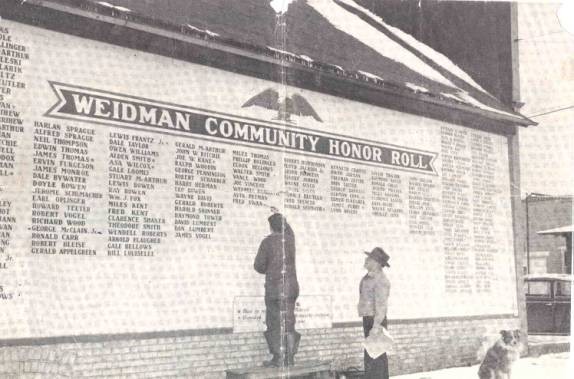
Home to the Village
By CONSTANCE ROE
The little town of Weidman, Michigan, has no
employment problems and no adjustment crises for its returning servicemen. The
author explains why.
That, of course, was before we began to
experience the amazing backwashes of war that were to come. It was before we'd
imagined that a townlike ours, with its characteristically intimate customs
and its slow pace of living, was to have a place in the pattern of war and the
readjustment to peace. One of our truly characteristic customs has been a
factor of real benefit to our returning veterans.
as Stuart, another son, set out to establish a
brilliant record with the 238th Combat Engineers, beginning with that first
bridge at Carentan. From the things Lieutenant Stuie sent home to his parents
thereafter you knew heexperienced a lot of hand-to-hand argument with Nazis
through France and Belgium and Germany. And Gladys, our most devout leader of
the local Methodist church, learned to exhibit the souvenirs, handing you a
couple of tarnished shoulder bars and telling you calmly, "These are from the
uniform of the first German Stuart shot." As though she were remarking, "Tlese
are a couple of dish towels from the Ladies' Aid."
get out of service. True, we've had certain
changes that were inevitable. John Ritchie died while his two sons were in
service, but Mrs. Ritchie, a frail, elderly woman, kept the home fires for
Jack and Don. Miles Drallette's wife died a year ago, but Wendell was in
India, and so the old home waited.

|
|
|
|
|
|
|
|
|
|
|
|
|||
|
WEIDMAN
COMMUNITY HONOR ROLL |
|||
|
|
|
|
|
|
|
|
|
|
|
Orval Abbott
|
Carl Thomas
|
Gerald McArthur
|
|
|
Norman Abbott
|
James J. Cole
|
John W. Ritchie
|
|
|
Chester Brien
|
Orval Bellinger
|
Joe W. Kane *
|
|
|
Donald Beutler
|
Mitchell McArthur
|
Ralph Woodin
|
|
|
Clayton Beutler
|
Alfred Gorleski
|
George Pennington
|
|
|
Fay Beutler
|
Howard Kolarik
|
Robert Scharrer
|
|
|
Clyde Chaffee
|
Keith Schultz
|
Harry Herman
|
|
|
Charles Darnell
|
Ernest Beutler
|
Leo Bowen
|
|
|
Floyd Fraley
|
David Flower
|
Wayne Davis
|
|
|
Otis Geasler
|
Calvin Ohls
|
Gerald Roberts
|
|
|
Ralph Geasler
|
Robert Kirvan *
|
Harold Skinner
|
|
|
Gaylord Hart
|
Orval Merrihew
|
Raymond Tower
|
|
|
Hugh H. Hobart
|
Russell Merrihew
|
David Lumbert
|
|
|
Lewis Jackson
|
Leighton McArthur
|
Dan Lumbert
|
|
|
Howard Jackson
|
Ernest Putman
|
James Vogel
|
|
|
Charles Johnson, Jr.
|
Don Dean Ritchie
|
Miles Thomas
|
|
|
Kenneth Jackson
|
David L. Russell
|
Phillip Bolinger
|
|
|
Ralph Leuder
|
James Maddox
|
Eldon Bellows
|
|
|
Marshall Conley
|
Theo C. Putman
|
Walter Smith *
|
|
|
Alvin Cummins
|
Otis Darnell *
|
Vance Wood
|
|
|
Bernard Losey
|
Fred Cole
|
Joe Vincent
|
|
|
John Cummings
|
Bernard Rau
|
Wendell Drallette
|
|
|
Robert Cox
|
Murel Kent
|
Avin Putman
|
|
|
LeRoy Beck
|
Hanford Conley
|
Fred Swan
|
|
|
Ralph Beck
|
Gurdon Elliot
|
Louis Mrazek
|
|
|
James Kent
|
William Tilmann
|
Raymond Bauer
|
|
|
Alden Tilmann
|
Raymond Kirvan
|
Ronald Gruss
|
|
|
Duane Stansell
|
Delbert Kirvan
|
Joseph Mrazek
|
|
|
Herbert Stankwitz
|
Wayne Bunting
|
Miles Bunting
|
|
|
Ford Stankwitz
|
Russell Swan
|
Clarence Blasen
|
|
|
Jack Stankwitz
|
Clair Morey, Jr.
|
Earl Vogel
|
|
|
Ervin Dutcher
|
Webb Darnell
|
Wayne Navarre
|
|
|
Marie Straus
|
Glen Place
|
Orville Sisco
|
|
|
Gerald Straus
|
Albert Lee
|
John Sheldon
|
|
|
Ike Hampton
|
Edd Bellows
|
Wilbur Sheldon
|
|
|
Wendell Sisco
|
Ralph Bellows
|
Ray Fraley
|
|
|
Marvin Sisco
|
Richard Christeson
|
Robert Voss
|
|
|
William Estes
|
Elmer Shawagan
|
Nile Liscomb
|
|
|
Lyle Wolfe
|
Bernard Esch
|
Ronald Husted
|
|
|
Robert Hutchinson
|
Kenneth Chaffee
|
Harlan Sprague
|
|
|
Floyd Jackson, Jr.
|
Owen Jarmen
|
Alfred Sprague
|
|
|
Arden Pridgeon
|
Freeman Leiter
|
Neil Thompson
|
|
|
Robert Jerred
|
Orin Leiter
|
Edwin Thomas
|
|
|
Wayne Sisco
|
George Darnell
|
James Thomas*
|
|
|
Virgi Sisco
|
Herman Cook, Jr.
|
Ervin Fergeson
|
|
|
John E. Beutler
|
Elmer Flaugher
|
James Monroe
|
|
|
Fred Spencer
|
James Purdy*
|
Dale Bywater
|
|
|
Donald Seymour*
|
Lynn Rogers
|
Doyle Bowen
|
|
|
Lewis Frantz, Jr. *
|
Dale Taylor
|
Jerome Schumacher
|
|
|
Owen Williams
|
Asa Wilcox*
|
Earl Oplinger
|
|
|
Alden Smith*
|
Gale Loomis
|
Howard Teeter
|
|
|
Lewis Bowen
|
Stuart McArthur
|
Robert Vogel
|
|
|
Ray Bowen
|
Wm. J. Fox
|
Richard Wood
|
|
|
Miles Kent
|
Fred Kent
|
George McClain, Jr.
|
|
|
Clarence Shaner
|
Theodore Smith
|
Ronald Carr
|
|
|
Wendell Roberts
|
Arnold Flaugher
|
Robert Bleise
|
|
|
Gale Bellows
|
Bill Louiselle
|
Richard L. Smith
|
|
|
Edward Blasen
|
Olen R. Bunting
|
Harold P. Breuer
|
|
|
Walter Rau
|
Paul Esch
|
Herman Kremsreiter
|
|
|
Walter J. Elias
|
Walter Fussmann
|
Raymond Hauck
|
|
|
Leo J. Smith
|
William Forbes
|
Howard Tilmann
|
|
|
John Ahlers
|
Roderick G. Rice
|
Kenneth Martin
|
|
|
Raymond T. Zuker
|
Clifford Gross
|
Leslie Shawagan
|
|
|
William G. Forbes *
|
Harvey Brien
|
Robert Benn
|
|
|
John Vincent
|
Virgil Gatehouse
|
Ercel Bywater
|
|
|
Gordon Williams
|
William Sprague
|
Gerald Wicks
|
|
|
William Conley
|
Edward Garrett
|
Melvin Ockert
|
|
|
Howard Blasen
|
Donald Kremsreiter
|
Edward Garrett
|
|
|
Randall Jackson
|
Richard Sprague
|
Edward Smith
|
|
|
Louis Schafer
|
Stephen Straus
|
Howard Spearman
|
|
|
Emil Mrazek
|
Aloysius Tilmann
|
Willard Thelen
|
|
|
Richard Tilmann
|
Albert Tilmann
|
Edward Kornexl
|
|
|
James Forbes
|
Claire L. Letson
|
Alexander Kreimsreiter
|
|
|
Andrew Kornexl
|
Clarence Lorenz
|
Kenneth R. Ley
|
|
|
Harold J. Rau
|
Dalton Shook
|
Oren Sheldon
|
|
|
B.F. Garlits
|
Donald Pohl
|
Norman Zuker
|
|
|
Herman Richter
|
Gerald Pung
|
Marvin Pridgeon
|
|
|
Stephen Pung
|
Albert Pung
|
Mack Kent
|
|
|
Edward Rau
|
Raymond Pohl
|
Glen Fritz
|
|
|
Carl Cook
|
John Reihl
|
Matt Kornexl
|
|
|
Gerald Appelgreen
|
Leo Embrey
|
Fred Kent
|
|
|
|
|
|
|
|
LEGEND |
|||
|
|
|
|
|
|
* Died in Action |
|||
|
* Wounded |
|||
|
* Missing |
|||
|
* Honorable
Discharge |
|||
|
* Prisoner of
War |
|||
|
|
|
|
|
|
|
|
|
|
|
|
||
|
|
|
|
|
|
|
|
|
|
|
|
|
|
|
|
|
|
|
|
